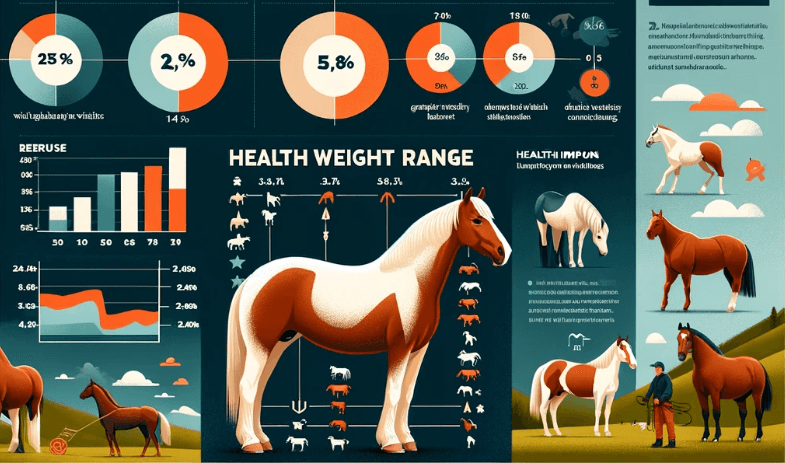Horse Weight Factors and Importance

Horses come in various shapes and sizes, and understanding their weight is crucial for their overall health and well-being. The average horse weight can vary depending on several factors, including breed, age, and activity level. It is important for horse owners and caretakers to have a clear understanding of equine weight management to ensure the best possible health outcomes for their horses.
Horse health and weight are closely interconnected, and maintaining an appropriate weight is essential for the horse’s overall well-being. Just like humans, horses can face various health issues if they are underweight or overweight. An underweight horse may struggle with poor energy levels, a weakened immune system, and even organ failure. On the other hand, an overweight horse is at risk of developing metabolic disorders, such as equine metabolic syndrome or laminitis. Therefore, monitoring and managing horse weight is of utmost importance.
Equine weight management involves balancing the horse’s diet, exercise routine, and monitoring their body condition score. A horse’s diet should consist of the appropriate amount of forage, such as hay or pasture, along with any necessary supplements or concentrates. Regular exercise is also crucial for maintaining a healthy weight, as it helps burn calories, build muscle, and improve overall fitness. Additionally, regularly evaluating a horse’s body condition score – a system that assesses the amount of fat and muscle on a horse’s body – can provide valuable insights into their weight management progress.
Content:
Factors Affecting Horse Weight
Horse health and weight are influenced by various factors, including:
- Eating habits and diet: The type and amount of food a horse consumes plays a significant role in maintaining a healthy weight. Horses that have access to pasture and graze throughout the day often maintain a more ideal weight than those on restricted diets or confined to stalls.
- Exercise level and workload: The amount of exercise a horse receives can impact its weight. Regular exercise helps to build muscle and manage body fat, contributing to a healthier weight.
- Age and breed: Different horse breeds have different body types and natural body weights. Additionally, age can affect a horse’s metabolism and nutrient requirements, which can impact weight management.
- Health conditions: Certain health conditions, such as metabolic disorders, gastrointestinal issues, or dental problems, can affect a horse’s weight. These conditions may require special dietary considerations or veterinary treatment to maintain a healthy weight.
Equine weight management is essential for overall horse health and can help prevent or manage various health issues. Monitoring a horse’s weight and adjusting its diet and exercise as necessary is crucial for maintaining an optimal weight. The average horse weight can vary depending on the factors mentioned above, but it is generally recommended for horses to maintain a body condition score between 4 and 6 on a scale of 1 to 9.
Ideal Horse Weight Range
Horse health and weight are closely related, as maintaining a horse’s weight within the ideal range is important for their overall well-being. The average horse weight can vary depending on factors such as breed, age, and workload.
So, how much does a horse weigh? On average, a horse can weigh anywhere from 900 to 2,200 pounds (410 to 1,000 kg). However, it’s crucial to note that ideal weights can vary among different horse breeds and disciplines.
Understanding the ideal horse weight range is essential for horse owners and caregivers. Keeping a horse’s weight within this range helps prevent health issues such as obesity or malnutrition. It also ensures that the horse has enough energy to perform their daily activities and maintain optimal body condition.
Factors such as diet, exercise, and overall health play a vital role in maintaining a horse’s weight. Regular monitoring, along with proper nutrition and exercise, can help keep a horse within their ideal weight range.
Consulting with a veterinarian or equine nutritionist is highly recommended for determining the ideal weight range for a specific horse. They can offer personalized guidance and create a suitable diet and exercise plan to help the horse achieve and maintain a healthy weight.
Overall, understanding the ideal horse weight range is crucial for promoting horse health and ensuring their overall well-being, allowing them to live a happy and fulfilling life.
Horse Weight and Body Condition Scoring
Keeping track of a horse’s weight is an essential part of equine weight management and overall health. Knowing the average horse weight for your specific breed and age group can help you monitor the horse’s body condition and make necessary adjustments to their diet and exercise regimen.
Body condition scoring (BCS) is a method commonly used by horse owners, trainers, and veterinarians to assess a horse’s overall body fat and muscle condition. It involves visually and physically evaluating specific areas of the horse’s body, such as the ribs, withers, and tailhead.
BCS is usually scored on a scale of 1 to 9, with 1 being extremely underweight and 9 being obese. By regularly assessing a horse’s body condition score, you can determine whether they need to gain or lose weight and make appropriate changes to their feeding and exercise routine.
Monitoring horse weight and body condition is crucial for maintaining their overall health and well-being. An overweight horse is at risk for conditions such as laminitis and metabolic disorders, while an underweight horse may be more prone to infections and lack energy for optimal performance.
Factors such as age, breed, metabolism, and activity level can all affect a horse’s weight and body condition. It’s important to work closely with a veterinarian or equine nutritionist to develop a feeding plan that meets the specific needs of your horse.
In conclusion, understanding horse weight and body condition scoring is essential for proper equine weight management. Regularly monitoring and adjusting a horse’s diet and exercise regimen based on factors such as average horse weight and body condition score can help ensure their overall health and well-being.
Horse Weight and Nutrition
Understanding a horse’s weight is crucial for equine weight management and overall health. How much does a horse weigh? The average horse weight can vary depending on the breed, age, and overall body condition of the horse.
Proper nutrition plays a significant role in maintaining a horse’s weight. Horses’ nutritional needs can vary depending on their activity levels, age, and overall health. In order to provide adequate nutrition, it is essential to understand the individual horse’s weight and adjust their diet accordingly.
When determining the appropriate diet for a horse, it is crucial to consider their weight and body condition. Horses that are underweight may require a higher calorie intake to support weight gain. In contrast, overweight horses may need a diet that promotes weight loss while still providing the necessary nutrients.
Monitoring a horse’s weight is key to ensuring proper nutrition. Regular weigh-ins using a horse weight tape or scale can help determine their current weight and track any changes over time. This information is then used to adjust their diet and feeding program accordingly.
In conclusion, understanding and managing a horse’s weight is essential for their overall well-being. By monitoring their weight and providing appropriate nutrition, horse owners can ensure their equine partners maintain a healthy body condition and optimal performance.
The Role of Exercise in Maintaining Horse Weight
Exercise plays a crucial role in maintaining the average horse weight and overall horse health. Equine weight management is a topic of utmost importance for horse owners and caretakers, as excessive weight can lead to several health issues.
Regular exercise helps in burning calories, building muscle mass, and improving metabolism, which are all essential for maintaining a healthy weight in horses. Just like humans, horses need physical activity to stay fit and maintain their weight.
When horses engage in regular exercise, they burn calories and fat, resulting in weight loss or maintenance. It can also help in managing weight-related conditions such as obesity and metabolic disorders. Moreover, exercising can increase a horse’s cardiovascular health and improve its endurance.
It is important to note that the type and intensity of exercise should be appropriate for the horse’s fitness level and age. A combination of cardio exercises, such as trotting and cantering, and strength-building exercises, like hill work and pole exercises, can be beneficial for maintaining a healthy weight.
Furthermore, exercise also has a positive impact on a horse’s mental well-being. It helps in reducing stress, anxiety, and behavioral issues, which in turn can affect the horse’s eating habits and weight.
However, it is essential to strike a balance when it comes to exercise and weight management. Over-exercising a horse or pushing it beyond its limits can result in injuries, fatigue, and weight loss. On the other hand, inadequate exercise can lead to weight gain and various health problems.
In conclusion, exercise plays a pivotal role in maintaining horse weight and overall equine health. A well-designed exercise regimen, incorporating cardio and strength-building exercises, can help in burning calories, building muscle mass, and improving metabolism. Horse owners and caretakers should pay attention to their horse’s fitness level, age, and overall well-being when planning an exercise routine for weight management.
Horse Weight and Health Conditions
Understanding horse weight is essential for maintaining the overall health and well-being of horses. Knowing how much a horse should weigh is important for equine weight management and can serve as a useful indicator of their health.
The average horse weight can vary depending on factors such as breed, age, and height. However, it is generally recommended that a horse should weigh between 900 to 1,500 pounds. This weight range is considered optimal for most horses and helps ensure that they are in good physical condition.
Monitoring a horse’s weight is crucial for detecting any potential health conditions or issues. If a horse is consistently underweight or overweight, it could indicate problems such as malnutrition, metabolic disorders, or digestive issues. These conditions can negatively impact a horse’s overall health and performance.
Inadequate nutrition can lead to a weakened immune system, poor muscle development, and reduced stamina. On the other hand, excessive weight can put strain on a horse’s joints, increase the risk of developing laminitis, and lead to obesity-related health issues.
To maintain a healthy weight, it is important to provide horses with a balanced diet tailored to their specific needs. This includes providing them with appropriate amounts of hay, grains, and supplements, as well as regular exercise and turnout.
In summary, understanding horse weight and its importance is crucial for equine weight management and overall horse health. Monitoring a horse’s weight and making any necessary adjustments to their diet and exercise routine can help prevent and address potential health conditions, ensuring that they lead happy and healthy lives.
Horse Weight and Age
Understanding the relationship between a horse’s weight and age is crucial for maintaining the horse’s health and ensuring proper care. The weight of a horse can vary greatly depending on its age and breed.
As horses grow and develop, they go through different stages that can affect their weight. In general, foals are born weighing around 100 pounds and can gain around 3 pounds per day during their first few months. As they reach their first year, their weight can range from 400 to 600 pounds, depending on their breed and genetics.
As horses continue to grow, their weight will increase steadily until they reach maturity. The average weight of an adult horse can vary greatly, depending on its breed, size, and overall health. On average, a mature horse can weigh anywhere from 900 to 2,000 pounds.
The Importance of Horse Weight
The weight of a horse plays a crucial role in its overall health and well-being. It is essential to monitor a horse’s weight to ensure that it is within a healthy range. If a horse is underweight, it may indicate underlying health issues or improper nutrition, which can lead to various health problems.
Conversely, if a horse is overweight, it can put excessive strain on its joints and organs, leading to conditions such as laminitis, insulin resistance, and metabolic disorders. Regularly assessing a horse’s weight and adjusting its diet and exercise routine accordingly can help maintain optimal health and prevent these issues.
Factors Affecting Horse Weight
Several factors can contribute to variations in a horse’s weight. These include genetics, breed, diet, exercise, and overall health. Some breeds are naturally heavier or naturally leaner, while others are prone to gaining weight more easily.
The type and amount of food a horse consumes can also greatly impact its weight. A balanced diet, appropriate for the horse’s age, activity level, and overall health, is essential to maintain a healthy weight. Regular exercise is also crucial, as it helps burn excess calories and promotes muscle development.
In summary, understanding how much a horse weighs and how it can vary with age is essential for proper horse care. Keeping a horse at a healthy weight is vital for its overall health and well-being. Regular monitoring, appropriate diet, and exercise are all key factors in maintaining a horse’s weight within a healthy range.
Horse Weight and Breed Differences
When it comes to horse weight, there can be significant differences among different breeds. Each breed has its own average horse weight, which can vary depending on various factors such as genetics, body structure, and purpose of the horse.
- The average horse weight can range from around 900 to 2,200 pounds.
- Some larger draft horse breeds, such as the Clydesdale or Shire, can weigh even more, reaching up to 2,600 pounds.
- On the other hand, smaller horse breeds, like the Miniature Horse or Icelandic Horse, can have an average weight of around 300 to 400 pounds.
Understanding these breed differences is important for equine weight management. Horse owners and caretakers need to be aware of the expected weight range for their specific breed in order to properly monitor their horse’s health and well-being.
In addition to breed, other factors can also influence how much does horse weight. These factors can include diet, exercise, age, and overall body condition. It is important to consider these factors when developing a feeding and exercise plan for a horse to ensure it maintains a healthy weight.
In conclusion, horse weight can vary significantly depending on the breed, and understanding these breed differences is essential for proper equine weight management. By knowing the average horse weight for a specific breed, horse owners can better monitor their horse’s health and make informed decisions regarding their diet and exercise regimen.
Measuring Horse Weight: Techniques and Tools
Equine weight management is an important aspect of overall horse health and well-being. Knowing how much a horse weighs can help determine the appropriate amount of feed, supplements, and exercise needed to maintain a healthy weight. Additionally, monitoring a horse’s weight can also help identify any underlying health issues or changes in condition.
Techniques for Measuring Horse Weight
There are several techniques available for measuring a horse’s weight, depending on the resources and equipment available. Here are a few commonly used methods:
- Weigh Bridge: A weigh bridge is a large scale that is specifically designed for weighing horses. The horse is led onto the scale, and the weight is recorded. This method provides an accurate measurement of the horse’s weight.
- Tape Measurement: A tape measurement can be used to estimate a horse’s weight based on its body length and girth measurements. Various formulas are available to calculate weight using these measurements. While not as accurate as a weigh bridge, tape measurement can provide a reasonable estimation of the horse’s weight.
- Weight Estimation Formulas: There are various weight estimation formulas that can be used based on different measurements, such as body length, girth, and height. These formulas take into account the horse’s size and body condition to estimate its weight. While not as precise as other methods, weight estimation formulas can be useful in situations where a weigh bridge or tape measurement is not available.
Tools for Measuring Horse Weight
When weighing a horse, it is important to have the necessary tools to accurately measure its weight. Here are some common tools used for measuring horse weight:
- Weighing Scale: A heavy-duty scale, such as a weigh bridge or equine scale, is the most accurate tool for measuring a horse’s weight.
- Tape Measure: A flexible tape measure is used to measure the horse’s body length and girth, which are then used in weight estimation formulas.
- Weight Estimation Charts: Weight estimation charts provide pre-calculated weights based on the horse’s measurements, serving as a quick reference for weight estimation.
Measuring a horse’s weight is an important part of equine weight management. By utilizing the appropriate techniques and tools, horse owners and caretakers can ensure that their horses maintain a healthy weight, promoting overall health and well-being.
The Importance of Monitoring Horse Weight
Understanding the average horse weight and knowing how much a horse weighs is crucial for equine weight management. Regularly monitoring a horse’s weight can help identify any changes in their overall health and well-being.
By tracking a horse’s weight, you can better assess their nutritional needs and adjust their diet accordingly. Weight gain or loss can be an indicator of potential health issues, such as digestive problems, metabolic disorders, or parasites.
Additionally, maintaining a horse at an optimal weight is essential for their performance and athletic ability. Being overweight can put excessive strain on their joints, leading to increased risk of injury and decreased performance. On the other hand, being underweight can result in reduced energy levels and overall weakened immune system.
Regularly monitoring and maintaining a healthy horse weight is therefore crucial for their overall well-being, longevity, and performance. It is recommended to consult with a veterinarian or equine nutritionist to develop a proper weight management plan for your horse.
Implications of Underweight Horses
Proper horse health and weight are crucial for maintaining optimal performance and overall well-being. When a horse is underweight, it can have several negative implications.
- Decreased energy levels: Underweight horses may lack the necessary energy to perform daily activities or participate in training and exercise.
- Reduced immune function: Insufficient body weight can weaken a horse’s immune system, making it more susceptible to diseases and infections.
- Poor coat condition: Horses that are underweight often have dull, dry, and unkempt coats, which can indicate inadequate nutrition and overall health.
- Difficulty recovering from illness or injury: Underweight horses may struggle to recover from illnesses or injuries due to a lack of essential nutrients and energy reserves.
- Reproductive issues: Female horses with low body weight may experience irregular reproductive cycles or have difficulty conceiving and carrying a foal.
- Impaired muscle development and strength: Inadequate body weight can hinder muscle growth and strength, leading to poor athletic performance and potential musculoskeletal issues.
It is essential to address the underlying causes of underweight horses promptly. This includes evaluating their diet, addressing any dental issues, and consulting with a veterinarian to rule out any underlying medical conditions. A tailored feeding plan, including appropriate quantities of forage and concentrates, can be implemented to help the horse regain weight gradually and achieve optimal health and performance.
Implications of Overweight Horses
When it comes to equine weight management, understanding the implications of overweight horses is crucial. While the average horse weight can vary depending on factors such as breed and size, excess weight can have serious consequences on a horse’s health and overall well-being.
So, how much does horse weight actually matter? Well, overweight horses are more prone to a variety of health issues such as laminitis, joint problems, and metabolic disorders. The extra weight puts excessive stress on their limbs and joints, leading to a higher risk of injuries and lameness.
Furthermore, carrying excess weight can also affect a horse’s performance and athleticism. Overweight horses may struggle with agility, endurance, and overall stamina, making it difficult for them to perform at their best, whether it’s in the show ring or on the trail.
Additionally, maintaining a healthy weight is essential for proper digestion and nutrient absorption in horses. Overweight horses may develop digestive disorders and have an increased risk of developing diseases such as colic and insulin resistance.
Proper weight management is key to ensuring the well-being and longevity of horses. Regular exercise, a balanced diet, and monitoring body condition scores are all crucial components of maintaining a healthy weight for horses.
In conclusion, understanding the implications of overweight horses is essential for equine weight management. Excess weight can lead to a variety of health issues, impact performance, and hinder proper digestion. By prioritizing weight management, horse owners can help their equine companions lead healthier and happier lives.
Q&A:
What factors can affect a horse’s weight?
There are several factors that can affect a horse’s weight. These include age, breed, genetics, diet, exercise routine, health conditions, and metabolism.
How can age affect a horse’s weight?
Age can affect a horse’s weight in several ways. Young horses may have difficulty maintaining weight due to rapid growth and high energy expenditure. Older horses may experience weight loss and muscle wasting due to dental issues, digestive problems, or age-related conditions.
What role does diet play in a horse’s weight?
Diet plays a crucial role in a horse’s weight. Horses need a balanced diet that provides appropriate amounts of fiber, protein, fats, vitamins, and minerals. Overfeeding or underfeeding can lead to weight gain or weight loss, respectively.
Why is it important to maintain a healthy weight for horses?
Maintaining a healthy weight is important for horses because excessive weight gain or weight loss can lead to various health problems. Overweight horses are at risk of developing metabolic disorders, joint strain, and respiratory issues. Underweight horses may also have compromised immune systems and reduced performance abilities.
Can exercise help in maintaining a horse’s weight?
Yes, exercise plays a significant role in maintaining a horse’s weight. Regular exercise helps burn calories, build muscle mass, improve metabolic efficiency, and promote overall health and fitness. However, exercise should be appropriately balanced with a horse’s diet and workload.


